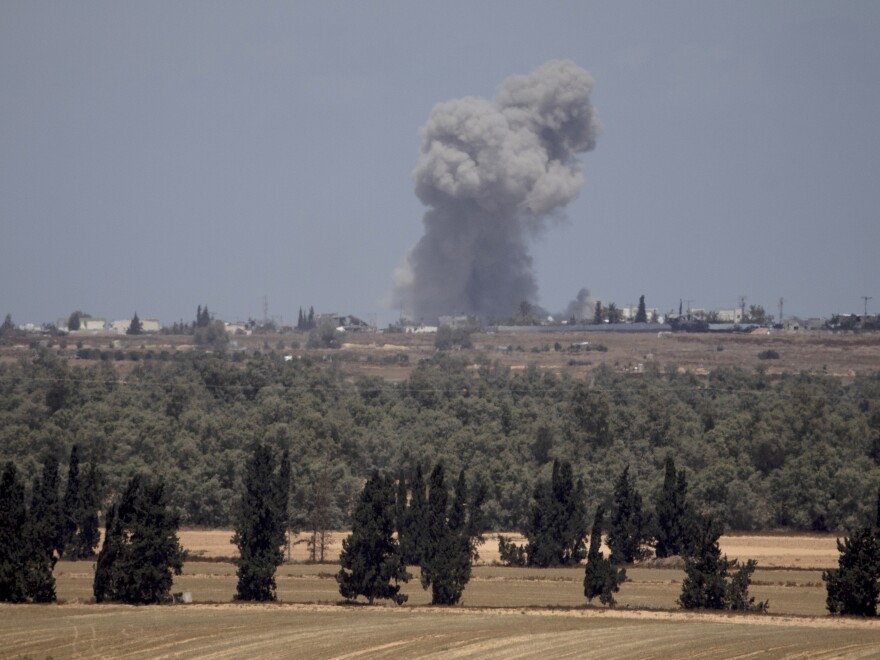A U.S. State Department report said Friday it was "reasonable to assess" that Israel has violated international humanitarian law while carrying out military operations in Gaza. But the report stopped short of drawing any final or sweeping conclusions about Israeli conduct in the war against Hamas.
The Biden administration voluntarily undertook this review of Israel and six other countries receiving U.S. weapons. While the administration is facing criticism at home and abroad, this report does not require it to take any specific actions.
The report reflects an administration that's become increasingly critical of Israel and frustrated with the way it's handling the war, though President Biden insists he still supports Israel and its aim of defeating Hamas in Gaza.
The report looked at two key questions: whether Israel has violated international law while using U.S. weapons, and whether Israel is restricting humanitarian aid.
On the first question, the report said: "It is reasonable to assess that [U.S.] defense articles ... have been used by Israeli security forces since October 7 in instances inconsistent with its [International Humanitarian Law] obligations or with established best practices for mitigating civilian harm."
The State Department findings cited multiple examples where large numbers of Palestinian civilians were killed in Israeli airstrikes. The reports said these instances raised serious concerns, but the U.S. did not have enough evidence to reach definitive conclusions.
More than 34,000 Palestinians have been killed in Gaza, according to Palestinian health officials, adding that about two-thirds were women and children. Israel, meanwhile, has said it has killed more than 13,000 Hamas fighters in Gaza.
On the question of humanitarian aid for Gaza, the report stated that Israel initially did not cooperate with the U.S. and international aid groups to let in humanitarian aid and thus "contributed significantly" to the lack of aid to the Palestinian people.
But that has changed over time, the report added.
"We do not currently assess that the Israeli government is prohibiting or otherwise restricting the transport or delivery of U.S. humanitarian assistance," it said.
However, aid groups say that incoming assistance has all but halted this week after Israeli troops took over the Rafah border crossing along Gaza's southern frontier with Egypt.
The Biden administration announced this week that the U.S. was withholding a weapons shipment to Israel consisting of more than 3,000 large bombs. And in an interview this week, Biden suggested he could pause the delivery of additional weapons as well.
The U.S. has been sending large quantities of weapons to Israel for decades, and ramped up deliveries after the Hamas attack on Oct. 7 that ignited the war.
The withholding of a single shipment of weapons is unlikely to have any impact on Israeli operations in Gaza, though it signals the administration's sense that Israel should take a different approach.
Red lines and Rafah
Biden and other top U.S. officials say they support Israel's goal of defeating Hamas in Rafah, its last stronghold, where it is believed to have several thousand fighters.
But the U.S. does not want to see a full-fledged assault on the city, similar to elsewhere in Gaza, which led to so many civilian casualties.
The U.S. says it has been demanding, but has not seen, a credible Israeli plan to move civilians out of harm's way in Rafah. The city had around 200,000 residents before the war began, but now has more than 1 million, many living in tent camps.
The Biden administration issued a national security memorandum in February which mandated the report on Israel and six other countries receiving weapons from the U.S., after congressional Democrats pushed Biden to determine whether Israel is violating domestic and international law in its war with Hamas.
The report and the memorandum from February does not have the legal teeth that would require the U.S. to stop arms transfers even if a country violates international law or has a more likely than not chance of doing so.
Biden and the Congress have the option to take further action. But Sarah Harrison, a senior analyst specializing in U.S. foreign policy at the International Crisis Group, said she doesn't expect that to happen.
The report, she said, "could make it harder for him to defend the unconditional assistance approach," Harrison said. But she emphasized the report does not require a change in his policy. "It's up to the president. It's still discretionary."
Meanwhile, Israeli leader Benjamin Netanyahu has maintained repeatedly that he will not bow to pressure from anywhere, including the White House.
The report presents further questions as to how Biden will navigate his tense relationship with Netanyahu. But Harrison said little has actually changed in Biden's policy, particularly on Rafah.
"He's threatening to change it, but not actually changing it," she said. "There are operations ongoing in Rafah, so it's not even clear what his red line is."
Copyright 2024 NPR



